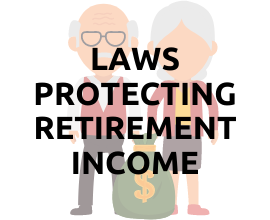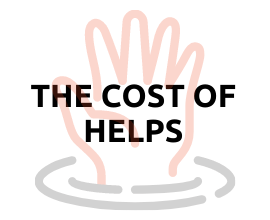Have You Been Sued By a Debt Collector or Creditor After Retirement or Becoming Legally Disabled?
If you've been sued by a debt collector or creditor and you are receiving social security benefits and/or retirement income, help is available for you. HELPS wants you to understand the laws protecting you from judgments resulting from lawsuits for debt. Please review the following list of of creditors and debt collectors who file lawsuits against persons only receiving protected income. We've helped other senior citizens and legally disabled persons sued by these companies and many others. Do not despair! There is hope.
Discover Bank
Bank of America
LVNV Funding, LLC
American Express
Goldman Sachs Bank
First National Bank of Omaha
Unifund CCR
Absolute Resolutions Investments, LLC
Langley Federal Credit Union
Lenders Loans
OneMain Financial Group
M&T Bank
Bank of the West
CKS Prime Investments, LLC
Second Round Sub, LLC
1st Franklin Financial Corporation
One Main Financial Group, LLC
JP Morgan Chase Bank
Velocity Investments, LLC
Credit Corp Solutions, Inc.
DNF Associates LLC
Jefferson Capital Systems, LLC
Department Stores National Bank
PCA Acquisitions V, LLC
Navy Federal Credit Union
Mariner Finance
Velocity Investments, LLC
TD Bank USA
CVI SGP-CO Acquisition Trust
Midland Credit Management
Midland Funding, LLC
Ford Motor Credit Company, LLC
Republic Finance, LLC
Barclays Bank
Wells Fargo
LVNV Funding, LLC
Capital One Bank
Crown Asset Management, LLC
Calvary SPV I, LLC
Portfolio Recovery Associates, LLC
Citibank
Synchrony Bank
Information About Issues Affecting Senior Citizens and Debt
Whether you're just researching your options or at the end of your rope, the following topics may provide some answers to your questions.
Get Some Help.
Have your case evaluated for free. We're here to help and we don't want you to worry. From shady debt settlement companies to busy bankruptcy attorneys, a lot of professionals fail to inform people with protected income about the laws protecting them.
Some websites and so-called legal “experts” give senior citizens advice about dealing with debt that amounts to advising you to glue a helmet to your head for protection from a possible meteor strike. Could it happen? It could. Will it happen? Well, the odds of being struck by a meteoriate are about one in 1,600,000. The likelihood of a credit card company wanting your 2008 Toyota Camry is just about as remote.
We believe senior citizens deserve access to information about the laws protecting their assets and social security and retirement incomes. Just because a person is not an attorney does not mean he or she cannot understand basic information and make better decisions based on understanding. For too long, access to basic legal information about what a debt collector really can do have been kept behind terrifying warnings and raised eyebrows of judgment.
The truth is, a lot of people are struggling with debt. Senior citizens are not immune to this problem. The National Counsel on Aging reports that about a third of senior households have no money left over each month after all debt expenses are met. And these are the households that can meet their debt expenses.
It might be hard to understand why access to realistic information about debt collection matters, until you're the one trying to pay for housing, medication, food and other basic expenses on a fixed income. When advice about debt comes without any consideration for the situation of the person seeking help, financial decisions are made based on unreasonable worry. We believe all senior citizens, disabled persons and veterans have the right to choose survival over paying for old debt.
What Does It Mean To Be Judgment Proof?
Judgment proof means a person, income or an asset is not vunerable to a judgment. In other words, a judgment proof person does not have any income vulnerable to garnishments or levies and none of their assets are worth more than the amounts protected by state and federal laws.
When is a Senior Citizen Judgment Proof?
A senior citizen is judgment proof when a creditor with a judgment against him cannot get any of his or her income or property through enforcement of the judgment.
Many Senior Citizens Are Judgment Proof.
A lot of senior citizens are judgment proof. A judgment allows the creditor to file what is called a "writ of execution", which in turn allows the creditor to garnish funds held by a third party that belong to you. These funds could be in a bank account or your employer. If your only income is social security, VA benefits, or most types of pensions, however, these funds are protected. They are judgment proof. Even net wages of $217.50 per week are protected from garnishment by federal law. Furthermore, in Pennsylvania, North Carolina, South Carolina and Texas, garnishment of wages is not permitted by law.
What About the Money In a Bank Account?
Federal regulations instruct banks and credit unions that twice the amount of monthly social security electronically deposited into a bank account is automatically protected from garnishment. These regulations do not require the funds in the bank account at time of the garnishment to be social security funds. The only requirement is that the social security check is directly deposited into the account.
If there is excess money in the bank account – more than twice the amount of the social security deposit – or if a senior has another bank account, a garnishment could temporarily freeze the senior’s account. If nothing is done, the money would be sent to judgment holder. In that instance a senior would need to file what is called a “claim of exemption.” This is a form shows the money in the garnished bank account came from monies that were exempt, such as social security, pension, disability or VA benefits.
Freezes on accounts can be largely avoided by having only one bank account – the bank account into which social security is deposited – and making sure there is never more than twice the amount of monthly social security in that account.
HELPS In The News
Read About HELPS in the news and current issues facing senior citizens.
- Deseret News discusses state laws that protect elderly debtors and profiles HELPS founder Eric Olsen and his work with HELPS in their July 9, 2019 edition
- Oregon State Bar Bulletin profiles HELPS founder Eric Olsen in their October 2016 issue
- Steve Rhode, the “Get Out of Debt Guy,” from WRAL in North Carolina, introduces HELPS
Published Journal Articles by HELPS Founder Eric Olsen
- “Seniors, Don’t Worry about Timeshares You Can’t Afford” published in MoneyTips, October 2018
- “Seniors and Affordable Transportation” published in MoneyTips, June 2018
- “How Seniors Should Handle a 1099c” published in MoneyTips, March 2018
- “Judge Learned Hand and Advising Bankruptcy Clients” published in the Consumer Bankruptcy Journal of the National Association of Consumer Bankruptcy Attorneys, Spring 2018
- “Saving Oklahoma Seniors” published in Oklahoma’s state bar association publication, Oklahoma Bar Journal, September 2017
- “Helping Seniors with Financial Issues” published in Washington’s state bar publication, NWLawyer, March 2017
- “Get on the Ball” published in Senior Voice of America, Americas largest seniors’ newspaper, February 2017
- “Helping Utah’s Lower-Income Seniors” published in Utah’s state bar publication, Utah Bar Journal, January 2017
- “Past Due Taxes and Seniors” published in Senior News & Living, December 2016
- “Guilt and Debt” published in Senior Voice of America, July 2016
- “Know How to Protect Your Income” published in Senior Voice of America, January 2016













